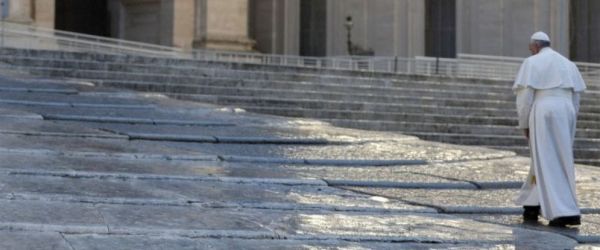We must get out of ourselves and go out onto the roads of man to discover that the wounds of Jesus are still visible today on the bodies of all those brothers and sisters who are hungry, thirsty, naked, humiliated, enslaved, in prison and in hospital. And precisely by touching these wounds, by caressing them, it is possible to "adore the living God in our midst".
The anniversary of the feast of St Thomas the Apostle offered Pope Francis the opportunity to return to a concept that is particularly close to his heart: putting his hands in the flesh of Jesus. The gesture of Thomas putting his finger in the wounds of the risen Jesus was in fact the central theme of the homily given during the Mass celebrated this morning, Wednesday 3 July, in the chapel of the Domus Sanctae Marthae. With the Pope concelebrated among others Cardinal Jean-Louis Tauran, President of the Pontifical Council for Interreligious Dialogue, who accompanied a group of employees of the dicastery.
After the readings (Ephesians 2:19-22; Psalm 116; John 20:24-29), the Holy Father first of all dwelt on the different attitudes taken by the disciples "when Jesus, after the resurrection, showed up": some were happy and joyful, others doubtful.
Incredulous was also Thomas to whom the Lord showed himself only eight days after that first apparition. "The Lord," said the Pope in explaining this delay, "knows when and why he does things. To each one he gives the time he thinks best". He gave Thomas eight days; and he wanted the sores to still appear on his body, even though it was "clean, beautiful, full of light", precisely because the apostle, the Pope recalled, had said that if he did not put his finger in the Lord's wounds he would not believe. "He was stubborn! But the Lord - commented the Pontiff - wanted a stubborn man to make us understand something greater. Thomas saw the Lord, he was invited to put his finger in the wounds of the nails, to put his hand in his side. But then he did not say: 'It is true, the Lord is risen'. No. He went further, he said: 'My Lord and my God'. He was the first of the disciples to make the confession of Christ's divinity after the resurrection. And he worshipped him'.
From this confession, the bishop of Rome explained, we understand what God's intention was: exploiting unbelief led Thomas not so much to affirm the resurrection of Jesus, but rather his divinity. "And Thomas," said the Pope, "worships the Son of God. But to adore, to find God, the Son of God had to put his finger in the wounds, put his hand at his side. This is the path'. There is no other.
Of course 'in the history of the Church,' the Pontiff continued in his explanation, 'there have been some mistakes on the path to God. Some believed that the living God, the God of Christians" could be found by going "higher in meditation". But this is "dangerous; how many get lost on that path and do not arrive?" the Pope said. "They arrive, yes, perhaps, at the knowledge of God, but not of Jesus Christ, Son of God, second Person of the Trinity," he specified. They do not get there. It is the path of the Gnostics: they are good, they work, but that is not the right path, it is very complicated" and does not lead to a good end.
Others, the Holy Father continued, "have thought that to arrive at God we must be good, mortified, austere and have chosen the path of penance, only penance, fasting. Not even these have arrived at the living God, at Jesus Christ the living God'. These, he added, "are the Pelagians, who believe that by their own effort they can arrive. But Jesus tells us this: "On the way we saw Thomas". But how can I find the wounds of Jesus today? I cannot see them as Thomas saw them. You find the sores of Jesus by doing works of mercy, by giving to the body, to the body and also to the soul, but I emphasise to the body of your brother who is soiled, because he is hungry, because he is thirsty, because he is naked, because he is humiliated, because he is a slave, because he is in prison, because he is in hospital. Those are the plagues of Jesus today. And Jesus asks us to make an act of faith in him through these wounds'.
It is not enough, the Pope added, to establish "a foundation to help everyone", nor to do "many good things to help them". All this is important, but it would only be the behaviour of philanthropists. Instead, Pope Francis said, "we must touch the wounds of Jesus, we must caress the wounds of Jesus. We must tend Jesus' sores with tenderness. We must literally kiss the wounds of Jesus". St Francis' life, he recalled, changed when he embraced the leper because he "touched the living God and lived in adoration". "What Jesus asks us to do with our works of mercy," the Pontiff concluded, "is what Thomas had asked: to enter into the wounds.
[Pope Francis at s. Marta, in L'Osservatore Romano, 04.07.2013]


